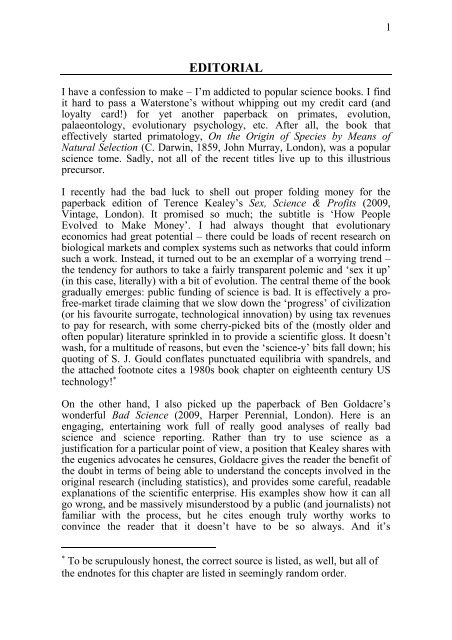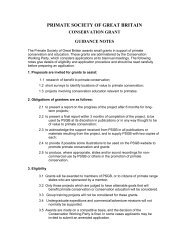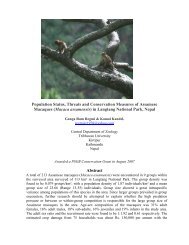2009 Vol 99.pdf (2.45mb) - Primate Society of Great Britain
2009 Vol 99.pdf (2.45mb) - Primate Society of Great Britain
2009 Vol 99.pdf (2.45mb) - Primate Society of Great Britain
Create successful ePaper yourself
Turn your PDF publications into a flip-book with our unique Google optimized e-Paper software.
1<br />
EDITORIAL<br />
I have a confession to make – I’m addicted to popular science books. I find<br />
it hard to pass a Waterstone’s without whipping out my credit card (and<br />
loyalty card!) for yet another paperback on primates, evolution,<br />
palaeontology, evolutionary psychology, etc. After all, the book that<br />
effectively started primatology, On the Origin <strong>of</strong> Species by Means <strong>of</strong><br />
Natural Selection (C. Darwin, 1859, John Murray, London), was a popular<br />
science tome. Sadly, not all <strong>of</strong> the recent titles live up to this illustrious<br />
precursor.<br />
I recently had the bad luck to shell out proper folding money for the<br />
paperback edition <strong>of</strong> Terence Kealey’s Sex, Science & Pr<strong>of</strong>its (<strong>2009</strong>,<br />
Vintage, London). It promised so much; the subtitle is ‘How People<br />
Evolved to Make Money’. I had always thought that evolutionary<br />
economics had great potential – there could be loads <strong>of</strong> recent research on<br />
biological markets and complex systems such as networks that could inform<br />
such a work. Instead, it turned out to be an exemplar <strong>of</strong> a worrying trend –<br />
the tendency for authors to take a fairly transparent polemic and ‘sex it up’<br />
(in this case, literally) with a bit <strong>of</strong> evolution. The central theme <strong>of</strong> the book<br />
gradually emerges: public funding <strong>of</strong> science is bad. It is effectively a pr<strong>of</strong>ree-market<br />
tirade claiming that we slow down the ‘progress’ <strong>of</strong> civilization<br />
(or his favourite surrogate, technological innovation) by using tax revenues<br />
to pay for research, with some cherry-picked bits <strong>of</strong> the (mostly older and<br />
<strong>of</strong>ten popular) literature sprinkled in to provide a scientific gloss. It doesn’t<br />
wash, for a multitude <strong>of</strong> reasons, but even the ‘science-y’ bits fall down; his<br />
quoting <strong>of</strong> S. J. Gould conflates punctuated equilibria with spandrels, and<br />
the attached footnote cites a 1980s book chapter on eighteenth century US<br />
technology! ∗<br />
On the other hand, I also picked up the paperback <strong>of</strong> Ben Goldacre’s<br />
wonderful Bad Science (<strong>2009</strong>, Harper Perennial, London). Here is an<br />
engaging, entertaining work full <strong>of</strong> really good analyses <strong>of</strong> really bad<br />
science and science reporting. Rather than try to use science as a<br />
justification for a particular point <strong>of</strong> view, a position that Kealey shares with<br />
the eugenics advocates he censures, Goldacre gives the reader the benefit <strong>of</strong><br />
the doubt in terms <strong>of</strong> being able to understand the concepts involved in the<br />
original research (including statistics), and provides some careful, readable<br />
explanations <strong>of</strong> the scientific enterprise. His examples show how it can all<br />
go wrong, and be massively misunderstood by a public (and journalists) not<br />
familiar with the process, but he cites enough truly worthy works to<br />
convince the reader that it doesn’t have to be so always. And it’s<br />
∗ To be scrupulously honest, the correct source is listed, as well, but all <strong>of</strong><br />
the endnotes for this chapter are listed in seemingly random order.






